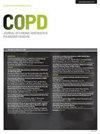The Dosing Strategy to Improve Adherence to Roflumilast in Treatment for Chronic Obstructive Lung Disease: A Systemic Review and Meta-Analysis
IF 3.1
3区 医学
Q1 Medicine
International Journal of Chronic Obstructive Pulmonary Disease
Pub Date : 2024-03-05
DOI:10.2147/copd.s440252
引用次数: 0
Abstract
Background: The clinical efficacy of roflumilast, an oral phosphodiesterase-4 inhibitor, has been demonstrated in patients with severe chronic obstructive pulmonary disease (COPD). However, roflumilast has shown frequent adverse drug reactions (ADRs). This study was performed to investigate the dosing strategy that will improve adherence to roflumilast in COPD.Methods: We conducted a systematic review and meta-analysis using PubMed, Embase, and Cochrane Central Register. The dosing strategy for roflumilast was classified into a dose-escalation group and a low-dose group. We investigated clinical outcomes according to dosing strategy.
Results: Five clinical trials involving 2424 patients were included. Both the dose-escalation and the low-dose groups showed a decrease in discontinuation rate compared to the standard dosing group for roflumilast (risk ratio [RR], 0.81; 95% confidence interval [CI], 0.67– 0.97; P = 0.02 and RR, 0.62; 95% CI, 0.48– 0.80; P < 0.01, respectively). In the two strategies, the pooled proportions of discontinuation were 27.9% and 11.7%, respectively. Although the pooled proportion of any ADR was not statistically decreased in the two strategies, diarrhea was significantly reduced in the low-dose group compared to the standard group (RR, 0.58; 95% CI, 0.42– 0.82; P < 0.01). The pooled incidence of acute exacerbations was similar between the low-dose and the standard groups (22.9% and 20.1%, respectively; P = 0.27).
Conclusion: Our findings show that the two alternative dosing strategies might have the benefit of improving adherence to roflumilast in COPD. Further large-scale trials are required to support our findings.
改善罗氟司特治疗慢性阻塞性肺病依从性的剂量策略:系统回顾与元分析
背景:口服磷酸二酯酶-4抑制剂罗氟司特对严重慢性阻塞性肺病(COPD)患者的临床疗效已得到证实。然而,罗氟司特经常出现药物不良反应(ADRs)。本研究旨在探讨可提高慢性阻塞性肺病患者罗氟司特依从性的给药策略:我们利用 PubMed、Embase 和 Cochrane Central Register 进行了系统回顾和荟萃分析。罗氟司特的剂量策略分为剂量递增组和低剂量组。我们根据给药策略调查了临床结果:结果:共纳入了五项临床试验,涉及 2424 名患者。与罗氟司特标准剂量组相比,剂量递增组和低剂量组的停药率均有所下降(风险比[RR],0.81;95% 置信区间[CI],0.67- 0.97;P = 0.02 和 RR,0.62;95% CI,0.48- 0.80;P <0.01)。在两种策略中,停药的汇总比例分别为 27.9% 和 11.7%。虽然在两种策略中,任何 ADR 的汇总比例均未出现统计学上的下降,但与标准组相比,低剂量组的腹泻显著减少(RR,0.58;95% CI,0.42- 0.82;P <;0.01)。低剂量组和标准组的急性加重发生率相近(分别为 22.9% 和 20.1%;P = 0.27):我们的研究结果表明,两种不同的给药策略可能会改善慢性阻塞性肺病患者对罗氟司特的依从性。需要进一步的大规模试验来支持我们的研究结果。
本文章由计算机程序翻译,如有差异,请以英文原文为准。
求助全文
约1分钟内获得全文
求助全文
来源期刊

International Journal of Chronic Obstructive Pulmonary Disease
RESPIRATORY SYSTEM-
CiteScore
5.10
自引率
10.70%
发文量
372
审稿时长
16 weeks
期刊介绍:
An international, peer-reviewed journal of therapeutics and pharmacology focusing on concise rapid reporting of clinical studies and reviews in COPD. Special focus will be given to the pathophysiological processes underlying the disease, intervention programs, patient focused education, and self management protocols. This journal is directed at specialists and healthcare professionals
 求助内容:
求助内容: 应助结果提醒方式:
应助结果提醒方式:


